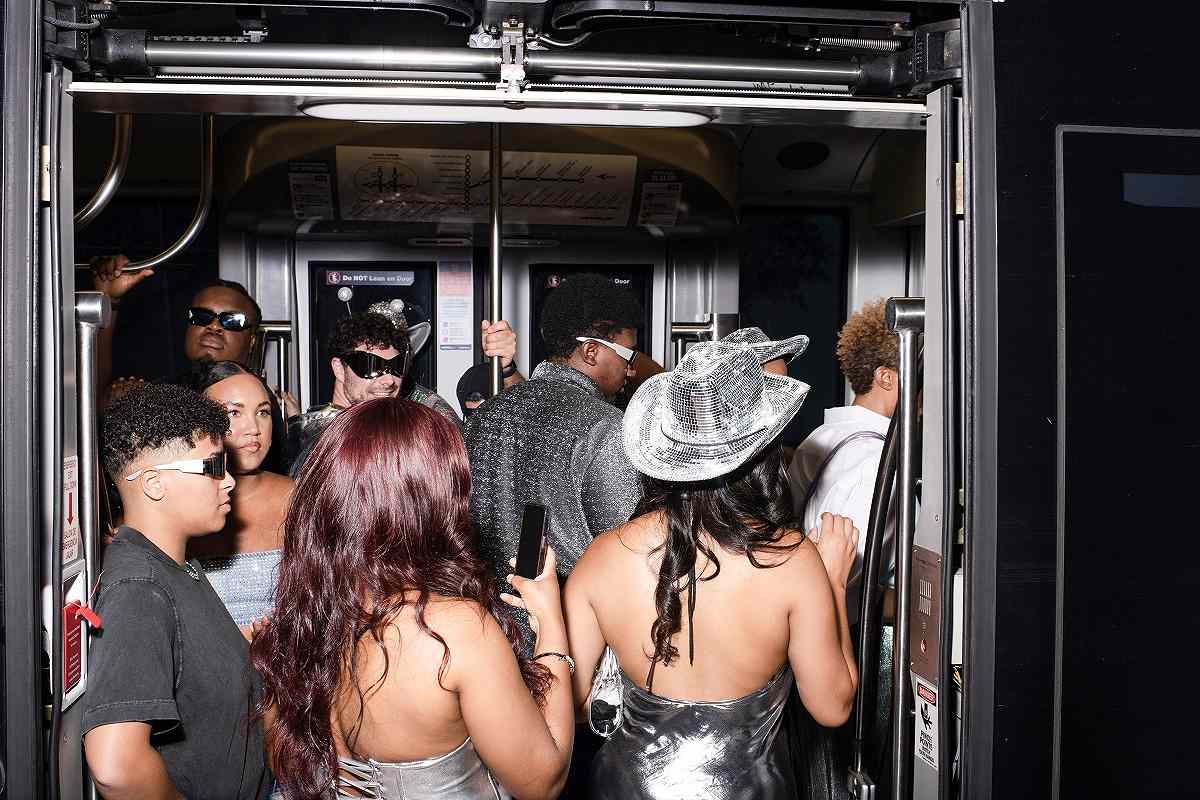
Beyoncé concertgoers board the Metro train in Houston on Sept. 24, 2023.
14:20 JST, March 30, 2024
Arriel Vinson hadn’t traveled much before the pandemic. Now she can’t stop.
The 28-year-old writer leaves her Dallas apartment every chance she gets: To see Beyoncé in Atlanta, Usher in Chicago and for girls’ trips in Jamaica and Mexico. When a favorite artist announces new tour dates, Vinson starts rallying friends and snapping up tickets, flights and hotel rooms for their next hurrah.
“My mind-set has completely changed after covid: When I see something I want to do, I make it happen,” she said, adding that her new priorities have required some financial rejigging. “For a while I was going to dinner all the time. I was getting things delivered, but now I’m like, ‘I don’t want to waste money on that.’ I want to travel and go to shows.”
Whatever you call it – doom spending, soft saving, YOLOing, “you only live once”- the coronavirus pandemic has changed the way Americans spend money. They are saving less but vacationing more, splurging on concerts and sporting events, and booking lavish trips years in advance. Spending on international travel and live entertainment surged roughly 30 percent last year, five times the rate of overall spending growth. Meanwhile, the personal savings rate is at lows not seen since the Great Recession.
And the spending spree has continued into 2024. Consumers spent $145.5 billion more in February than they did the month before – much of that on services – fueling the biggest monthly increase in more than a year, according to data from the Bureau of Economic Analysis released Friday. Meanwhile, the personal savings rate fell to 3.6 percent, from 4.1 percent the previous month.
Just like the Great Depression ushered in decades of frugality and austerity – with an entire generation reusing plastic bags, jam jars and aluminum foil – there are signs the coronavirus crisis has had the opposite effect: nudging Americans toward spending more, especially on experiences.
“When you live through a crisis, it gets ingrained in your brain,” said Ulrike Malmendier, a professor of behavioral finance at the University of California at Berkeley. “The official economic reports might say everything is coming back to normal, but we are different people than we were before the pandemic.”
Financial shocks have repeatedly reshaped the way people think about money, Malmendier said. “Depression babies,” those who came of age after the stock market crash of 1929, were notoriously mistrustful of banks and financial markets. People who have been unemployed are often cautious about spending long after they have found another job. And after the 2008 financial crisis, Americans began saving more of their paychecks, to guard against another massive downturn.
But unlike those financial crises, which led people to pull back, the coronavirus pandemic has left a decidedly different legacy.
“The adverse effects of covid weren’t necessarily financial; people got jobs quickly and the government stepped in with support,” Malmendier said. “Instead, it’s about all of the things we were starved for: human interaction, socializing, travel. People are spending money on the things they missed most.”
Carolyn McClanahan, a financial adviser in Jacksonville, Fla., is seeing this firsthand. Her clients are generally saving less than they were before the pandemic, she said. Instead of solely planning for retirement, they’re focused on “maximizing life now” to make room for more travel, concerts and fun.
“People already had this attitude that you only live once – and that’s been put on steroids,” she said. “Covid was a big wake-up call that life is precious, so you’ve got to enjoy it now.”
It helps that many Americans still have more money in the bank than they did before the pandemic. They have gotten substantial raises or higher-paying jobs that have made it possible to keep spending, despite inflation. Stock portfolios and home prices have soared, giving middle- and upper-class households an extra boost. As of last fall, Americans were still sitting on an extra $430 billion in pandemic savings, according to estimates from the Federal Reserve Bank of San Francisco. Yet consumers have been saving consistently less since the pandemic, with a particular drop-off last summer, coinciding with a strong spending boom.
Still, in a worrisome twist, families have been spending even if they don’t have the money. Credit card debt has risen 22 percent since the pandemic, and more shoppers are turning to ‘buy now, pay later’ installment plans for routine purchases. Bank 0f America cardholders, for example, spent 7 percent more on travel and entertainment last year than they did in 2022. European summer vacations were particularly popular, with a 26 percent increase from the previous year.
That momentum has continued into the new year. More Americans are traveling than they were a year ago, Transportation Security Administration passenger data shows. And a near-record 22 percent of Americans say they are planning to vacation in a foreign country in the next six months, roughly double pre-pandemic levels, according to Conference Board survey data released this week.
Meanwhile, Live Nation – the parent company of Ticketmaster and the world’s largest entertainment company – posted a record $23 billion in sales last year and expects this year to be even bigger.
“Shows are flying out the door from top to bottom,” chief executive Michael Rapino said in a February earnings call. “We’re seeing no slowdown on the consumer.”
In interviews with more than a dozen Americans, many acknowledged that they are financially better off than they were a few years ago. But just as importantly, they said, they were spending differently – cutting back on midweek restaurant visits, for example, or buying fewer clothes, in favor of big-ticket items and memorable experiences.
All that spending on services helped push economic growth even higher in late 2023, up to a strong 3.4 percent – making the latter half of 2023 the strongest since 2014, outside of the pandemic years, according to data out Thursday by the Bureau of Labor Statistics.
In Seattle, Mike Lee’s free time has become a whirlwind of comedy shows, concerts, hockey games and weekend trips. The software developer, who got divorced early in the pandemic, has been lining up experiences far in advance: Hawaii in April, a Foo Fighters show in August.
“It’s changed the way I move through life,” the 40-year-old said. “I used to save obsessively, almost to a fault, but I’m learning to go out and enjoy life a little bit more.”
But he isn’t splurging across the board. Lee still drives a 20-year-old Toyota Corolla and has cut his restaurant spending by half. Instead, he has stocked his freezer with soup dumplings, chicken wings and other prepared foods to hold him over on evenings when he doesn’t feel like cooking.
Those types of trade-offs, economists say, are likely to continue as households settle into new habits. Families are canceling HBO Max and Disney Plus subscriptions, for example, or ditching grocery delivery and getting rid of Pelotons they hoarded back in 2020.
“People are trying to find the right balance between how they lived during the pandemic and how they want to live now,” said Nadia Vanderhall, a financial planner in Charlotte “They’re spending more on experiencing life, but they’re also trying to figure out what it means for their finances.”
Although economists expect a drop-off in spending this year, some are revising their forecasts: Fitch Ratings, for example, now expects consumer spending to grow by 1.3 percent in 2o24, even after inflation, more than double what it had initially predicted. Consumers are poised to keep tapping into savings, the firm said, which is expected to “support spending well into 2024.”
Susan Blume, a travel agent in Garden City, N.Y., is already booking river cruises along the Danube for 2026. International travel has exploded in the past few years, she said, and this year is on track to top them all.
“Everybody was just so confined during the pandemic that they never want to have that experience again,” she said.
But the biggest surprise: the rush of travelers in their mid-20s, far younger than Blume’s usual clientele.
“Gen Z has a very different attitude – they’re not going broke on Gucci or takeout,” she said. “Instead they’re squirreling away for travel. And they’re already planning next year’s big trip: all of Italy or island-hopping in Greece, or four stops in France.”
It’s unclear exactly how long this era of experiential living will last, though economists say it’s likely to take a major shock, such as widespread job losses or a recession, to get Americans to rethink their spending.
“You have to really have a crash in employment to derail this consumer,” said Diane Swonk, chief economist at KPMG. “This spending isn’t just a mirage, it’s a fundamental change.”
That relentless consumption has invigorated the post-pandemic economy and propped up millions of service-sector jobs. But it has also contributed to a run-up in prices: Inflation for services is at 3.8 percent, compared with a 0.2 percent decline for goods in the past year. That’s creating an ongoing challenge for the Federal Reserve, which has specifically flagged the need to see services inflation cool.
“There is certainly a big question mark there: Can the Fed get hotel inflation, airline inflation, concert inflation down without slowing demand for those things?” said Torsten Slok, chief economist at Apollo Global Management. “But so far people are still spending.”
Michael Sheridan, who lives in Clearwater, Fla., has been on 13 cruises in 17 months. The latest, which he booked on a Friday afternoon, left for the Bahamas the next morning.
The 58-year-old, who once owned a couple of Outback Steakhouses, is on a fixed income. He receives $2,400 a month in Social Security Disability Insurance payments because of a rare genetic disorder that forced him to stop working a decade ago. Sheridan relies on a wheelchair to get around, but he says he has been financially fortunate: His mother, who died in 2020, left him enough cash to buy a $109,000 condo outright.
Now his monthly checks go toward homeowners association fees ($350), phone bills ($40), groceries ($250) – and travel. He’s in Japan now and headed to Seattle in April, the Caribbean in June and Switzerland in July.
“The pandemic absolutely fed this travel addiction,” he said, adding that he was quick to take advantage of cheap airfares and hotel rates during early lockdowns. “I just realized, if all of a sudden something goes south, I’m going to regret not having traveled while I could.”

A tourist is dressed up for a private photo shoot in St. Mark’s Square in Venice in February.
Top Articles in News Services
-

Survey Shows False Election Info Perceived as True
-

Hong Kong Ex-Publisher Jimmy Lai’s Sentence Raises International Outcry as China Defends It
-

Japan’s Nikkei Stock Average Touches 58,000 as Yen, Jgbs Rally on Election Fallout (UPDATE 1)
-

Japan’s Nikkei Stock Average Falls as US-Iran Tensions Unsettle Investors (UPDATE 1)
-

Trump Names Former Federal Reserve Governor Warsh as the Next Fed Chair, Replacing Powell
JN ACCESS RANKING
-

Producer Behind Pop Group XG Arrested for Cocaine Possession
-

Japan PM Takaichi’s Cabinet Resigns en Masse
-

Man Infected with Measles Reportedly Dined at Restaurant in Tokyo Station
-

Israeli Ambassador to Japan Speaks about Japan’s Role in the Reconstruction of Gaza
-

Videos Plagiarized, Reposted with False Subtitles Claiming ‘Ryukyu Belongs to China’; Anti-China False Information Also Posted in Japan

























